"If You Line Up a Long Row of Scholars, I'll Know Who's a Ba'al Teshuvah and Who's Not"
Rabbi Doron Rozilio has become a guide for many ba'alei teshuvah in recent years. He is involved in managing the 'Banaich Tzion' community in Givat Ze'ev alongside the community's rabbi, Rabbi Hagai Mazor. "This is a mixed community of ba'alei teshuvah and those born into Haredi families, and we are proud of it."
 Rabbi Doron Rozilio
Rabbi Doron Rozilio"I can summarize my personal story in a few words: I was born problematic, remained problematic, and so I will stay." We sit across from Rabbi Doron Rozilio, and he speaks with us with sparkling eyes. He never views the word 'problematic' as something negative... "At the core of our being lies curiosity, honesty, and courage," he says. Perhaps this is exactly what led him to this point.
"I am a ba'al teshuvah with thirty-five years of experience," Rabbi Rozilio continues, "I was born into a secular home. My father was a kibbutz member who founded Beit Guvrin, and I am a herder's son. Since I was young, I recall being an anarchist. I didn't finish school, didn't join the army, traveled abroad for four years, and wandered through half of the globe. I wrote a book about my journeys in South America. It's an intriguing book, at least that's what people say.
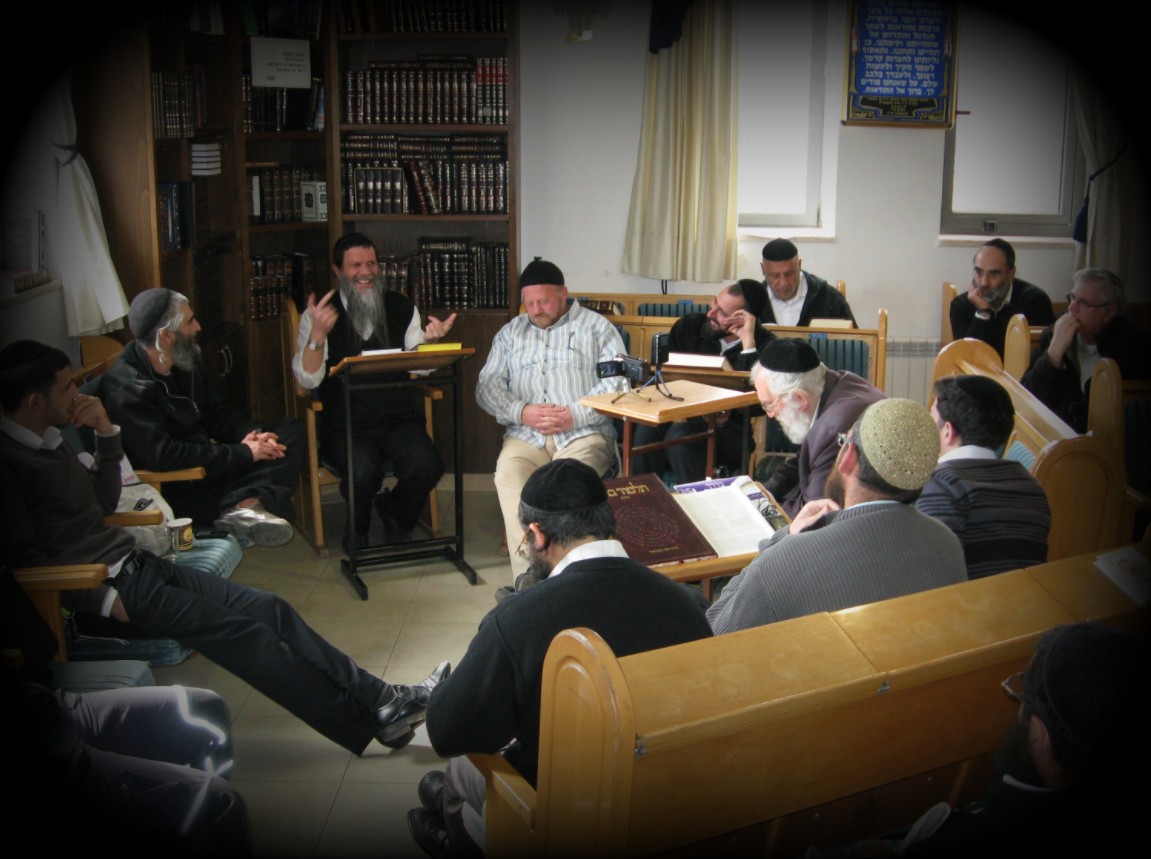
"The Gap Between Two Worlds is Vast"
According to Rabbi Rozilio, the world of teshuvah thirty-five years ago was not simple. "We tried to enter the Haredi community, but despite the good intentions, people didn't know how to help us, and many mistakes were made along the way."
"I learned firsthand how vast the gap is between us. It's written in the verse, 'Eye has not seen, O God, beside You,' and one explanation is that it refers to the ba'alei teshuvah."
Rabbi Rozilio emphasizes, "I absolutely do not blame anyone maliciously. The Haredi community did a wonderful job with us, and people helped us with immense dedication. But in the end, they couldn't fully integrate us perfectly, which isn't surprising. This is a very principled society with a clear life path, and we were the strange birds trying to join. But it is important for all of us, as ba'alei teshuvah, to allow ourselves to correct and move forward."
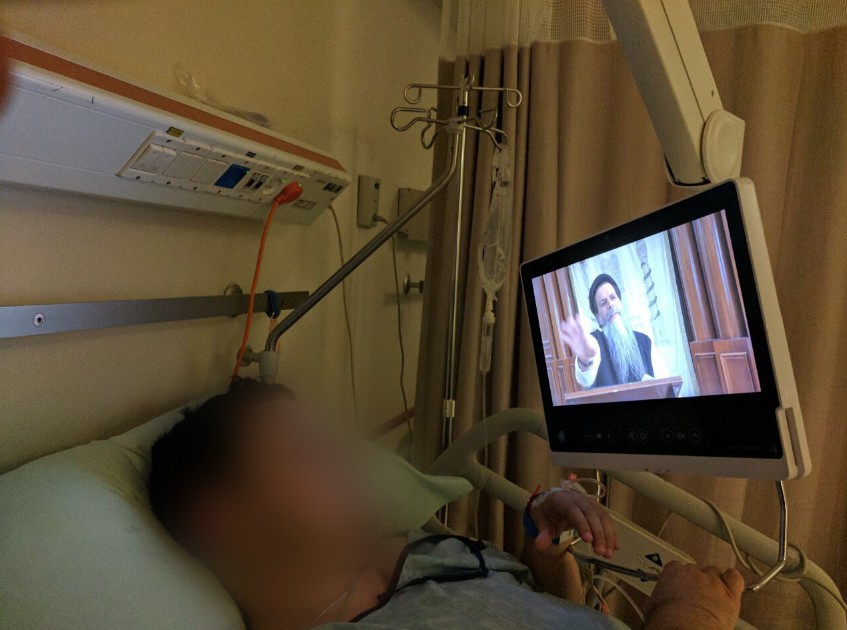 A patient watching a video of Rabbi Rozilio
A patient watching a video of Rabbi RozilioDo you think things have changed today?
"Yes, absolutely," he responds, "Today, those returning to Judaism won't go through what we felt in the past for a simple reason—a whole generation of ba'alei teshuvah has already undergone this process over thirty years ago, and now they welcome newcomers and are even happy to take responsibility for them."
According to Rabbi Rozilio, today's ba'alei teshuvah are more grounded and sophisticated. "I meet them up close and am happy to say that in most cases, they take things step by step, examining everything, and they aren't ashamed to ask questions. Gone are the days when a ba'al teshuvah felt that donning a kippah immediately instilled a fear of heaven and a sense of the world to come. Today, they are aware that putting on a kippah can be the start of a challenging path, a difficult trial. They know it's not guaranteed they will immediately see the light and sparks upon starting to observe the commandments, and they may face many difficulties and challenges, but they learn not to fear.
"They have a lot of self-confidence," Rabbi Rozilio concludes, "and allow themselves to say—we have what to be proud of, and we are capable of taking responsibility for our personal lives and caring for ourselves. I think that's exactly what is right and natural to do, and it's a good thing."
The Community Revolution
As part of the processes ba'alei teshuvah have undergone in recent decades, Rabbi Rozilio points out that various communities have been established in cities across the country specifically for ba'alei teshuvah. You can find them in places like Haifa and Ma'alot, as well as in settlements in Yehuda and Shomron, and even in Mitzpe Ramon. Additionally, yeshivas for ba'alei teshuvah and kolels have been established for them. "Someone returning to faith today can know there is a way for them to integrate, a place for them to take their first steps, in places where they will not be rejected, and most importantly, will be understood."
Do you think this approach is suitable for everyone? Perhaps some ba'alei teshuvah can integrate into the Haredi community from the start?
"Certainly, some can, and if they can do so, by all means, but from my experience, that is the minority. Most ba'alei teshuvah will feel better when they are in a community with others like them."
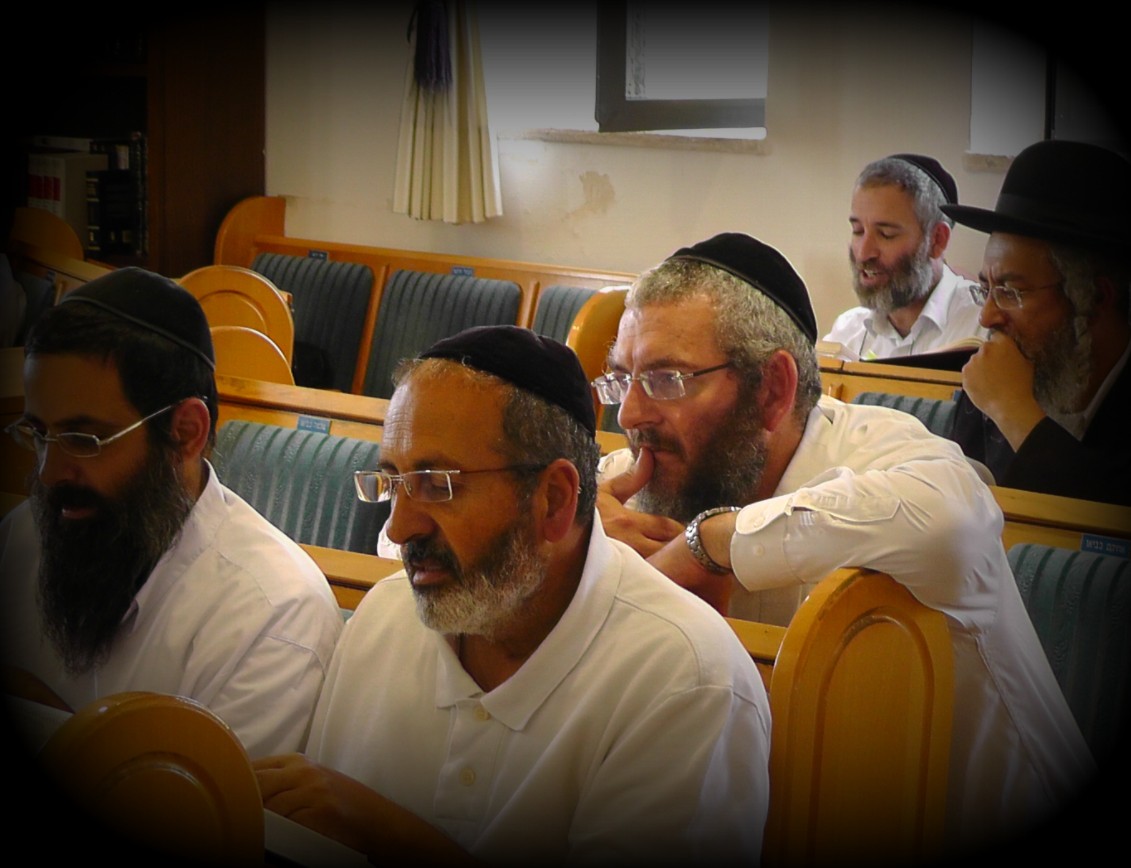
And Rabbi Rozilio tells of a very unique community that he had the privilege of helping establish in Givat Ze'ev in northern Jerusalem. "We established the community about fifteen years ago to be a warm home for ba'alei teshuvah. Here we have also founded a kolel where twenty-five scholars learn, some residents of the neighborhood, some 'imports' from Modiin Illit and other places. As ba'alei teshuvah, we feel affiliated with all parts of the Jewish people, so we don't give up on any part. We study Chassidut, and Nefesh HaChaim, Likutei Moharan, and Sfat Emet, and of course, Gemara, Mishnah, and Chumash. We learn everything here."
The community, which has only grown over the years, offers an extensive social activity in addition to study. "Between the scholars, very close social bonds form," Rabbi Rozilio shares. "Our community leader, Rabbi Hagai Mazor, gives many lessons on various subjects, and we strive to spread the message as much as possible in the area. As part of this effort, we also have a very rich website, there are lessons posted on Facebook, and it's intended for the general public. Our feeling is that we have much to offer everyone, and we share it outward. Additionally, we deliver lessons across the country."
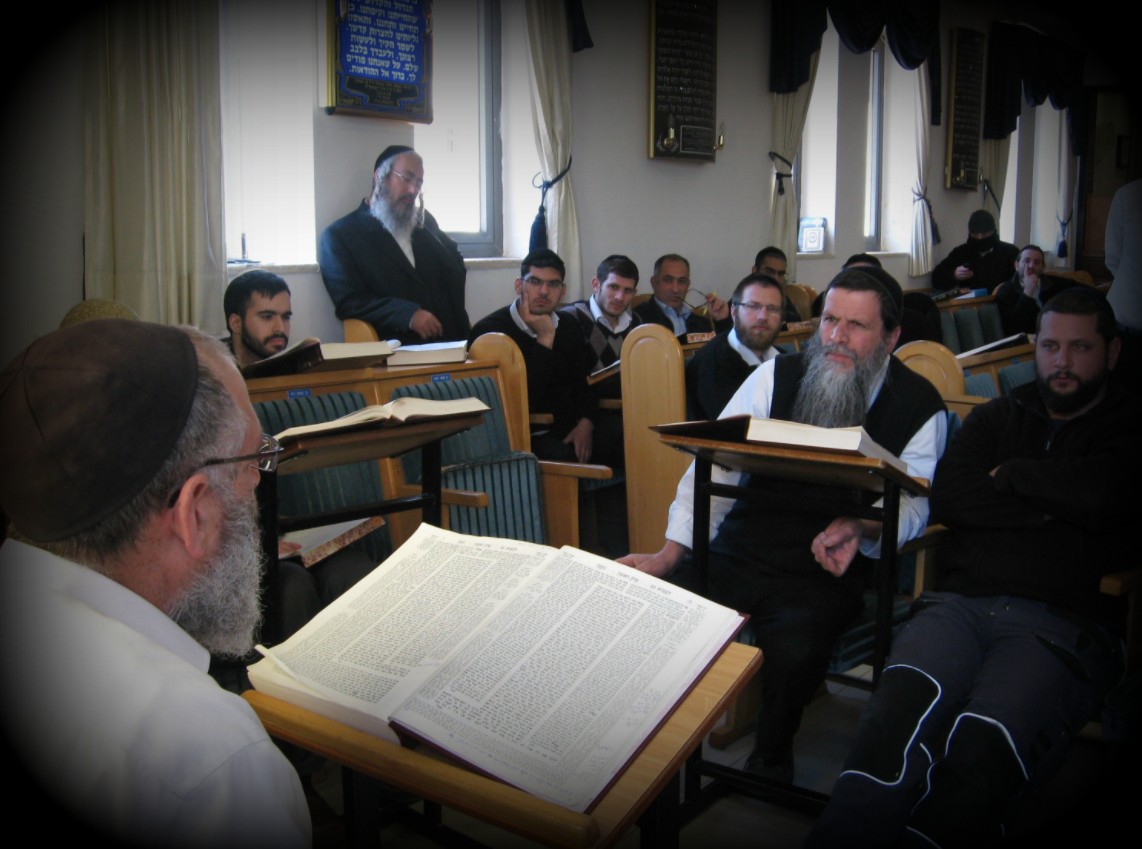
The most interesting thing is that, according to Rabbi Rozilio, the kolel has begun to welcome young scholars who are not ba'alei teshuvah but are Haredi from birth. They came to live in the neighborhood and decided that the kolel for ba'alei teshuvah suited them best.
You’re actually describing a reverse situation—instead of ba'alei teshuvah attaching to the Haredi community, the Haredi attach to ba'alei teshuvah...
"Exactly," he agrees. "Of course, we welcome everyone, and we have a remarkable and fascinating connection. Though sometimes we 'clash' or have spirited discussions, the insights are amazing. My personal feeling is that the scholars are wonderfully completing our puzzle. We suddenly feel whole. When people come to me asking to join, I tell them one thing: we have one admission condition—desire. If you really want and feel good with us, you're in....
"And I must say," he adds, "that at first, the Haredi scholars looked at us like strange birds, but now they even look at us with admiration. I think it's because we're revealing to them a kind of connection to Hashem."
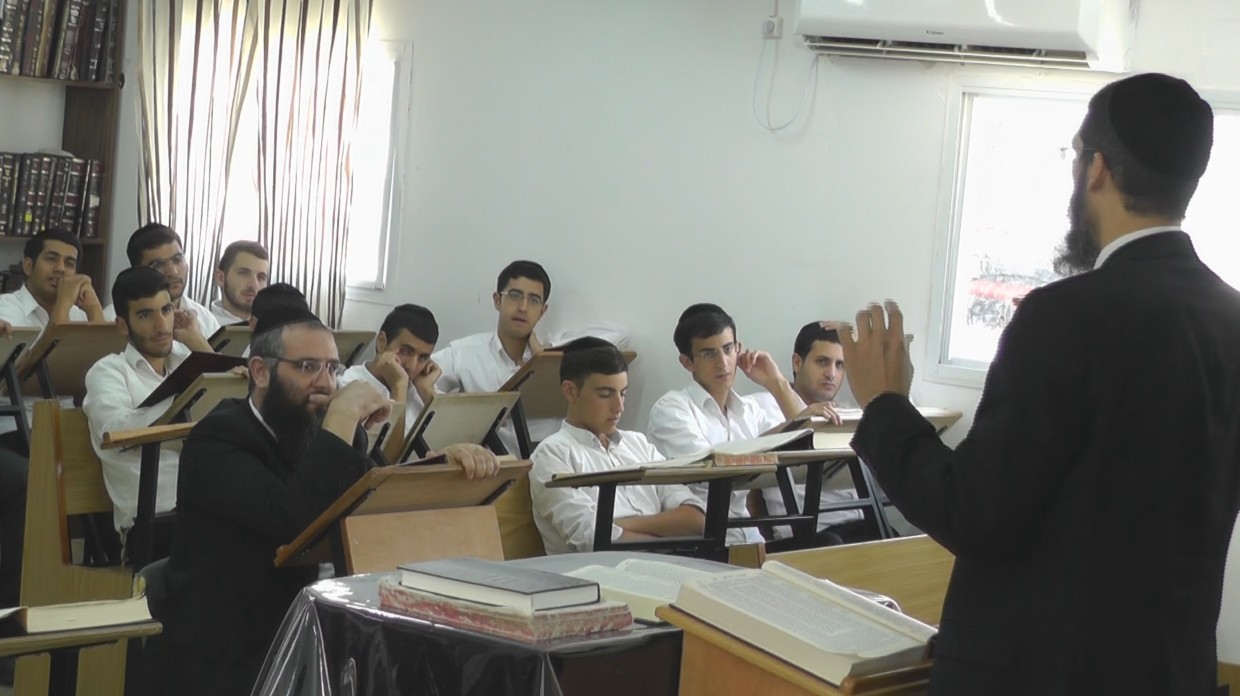
Rabbi Rozilio, we have a question—if scholars were to stand in a line now, would you be able to discern who among them is a ba'al teshuvah and who is not?
Rabbi Rozilio's answer is particularly moving: "Yes, you are welcome to line up twenty people I don't know, and I will go through and point without hesitation who is a ba'al teshuvah and who is not because ba'alei teshuvah have a special sparkle in their eyes, and it's a sparkle that doesn't fade."
And he has a final message to share: "When I'm asked, 'What is your model?' I reply that our model is diverse. The roof of the Mishkan was made from the skin of an animal called a tachash, which had 'six in its colors.' The skin of the tachash was spread over the Mishkan, creating a magnificent appearance. But to see these amazing colors, one had to climb high, reach the bird's-eye view, and only then could they see it. Somehow, I feel this hints at us. Whoever strives and rises above themselves can undoubtedly see the wonderful colors we have—ba'alei teshuvah."
Website address: www.pshita.co.il

